What would happen if humanity would lose all the satellites?
 Bashny.Net
Bashny.Net
Since their commissioning 60 years ago, satellites have become indispensable and an integral part of our modern high-tech world. We are so used to their reliability and the actual stealth that take satellites for granted. Portal Gizmodo decided to find out what might happen if suddenly all the satellites that are currently circling around our planet, suddenly fail or simply disappear.
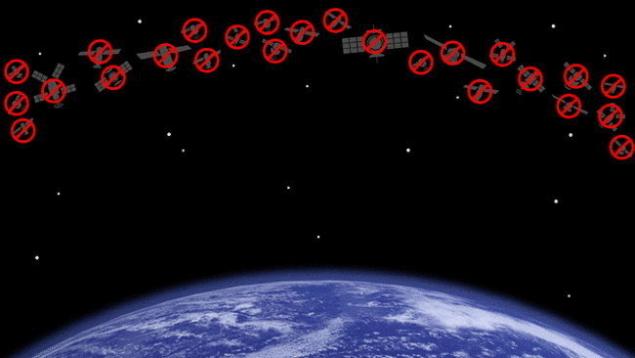
The assumption that the failure of all satellites or at least large numbers of, not as crazy as it may seem at first glance. There are at least three possible scenarios in which this can sooner or later occur.
For example, in a science fiction story "Ghost Fleet: A Novel of the Next World War" which will soon appear on store shelves, says that satellites can be shot down as a result of actions of the warring countries. In this book authored by P. W. singer and August stake a story like that in the near future go to war in which the Chinese government decides to use high-energy weapons mounted on satellites-interceptors to destroy the important strategic points in the United States. As a result, dozens of near-earth satellites are destroyed even before the moment starts fighting on the ground.
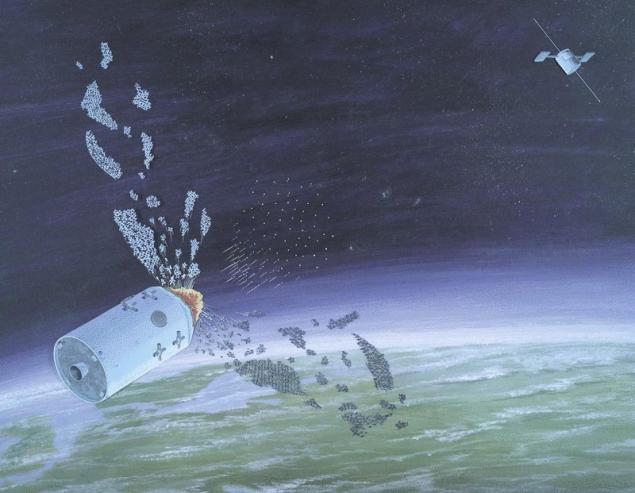
1986 DIA illustration of the work of the satellite interceptor, attacking your target
There is another scenario, in which all satellites can be destroyed. Jeff Cater, associate Professor Institute named the George C. Marshall research center in Virginia, engaged in scientific and socio-political issues — says that the combatants can destroy satellites from the ground stations using special jammers, missiles, lasers, and nuclear weapons.
In addition, all of our satellites can be destroyed by very strong solar storm. The so-called Carrington Flare, a solar hurricane, one of which happened, for example, in 1859. Occured he now — and all of our high-tech civilization back in development back several generations. How the portal Universe Today, such a heavy duty geomagnetic storm will simply cause an overload in power transmission systems on Earth and fry all our electronic devices, including those that are in orbit of the planet.
"In this case, particles pass through the Earth and carry the incredibly powerful electrical discharge," writes Universe Today.- "If close to Earth are satellites, they in most cases are under the protection of the geomagnetic field of the planet, but the satellites in higher orbits, especially those that are in geosynchronous orbits, completely defenseless against such phenomena. In the storm inside the satellite will accumulate charged particles, which in the end will release a powerful electrical discharge that will lead to a complete damage of the components of the satellite. They'll just burn out."
Universe Today indicates that now, several hundred satellites in geosynchronous orbit around the planet, remain very vulnerable. The risk factor also includes the satellites at an altitude of 20,000 kilometers and are responsible for the GPS network.
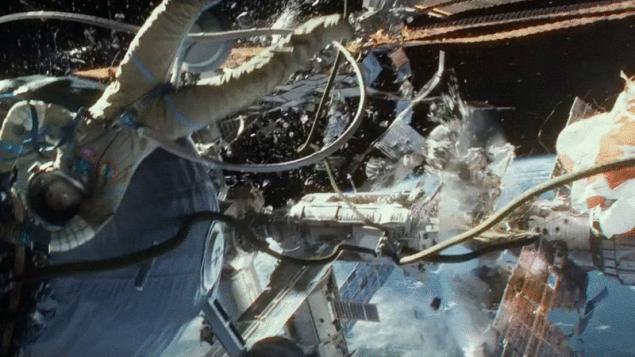
Gravity
In the end, one should not exclude the Syndrome (the Effect) Kessler. This scenario was described in the film "gravity" 2013. Downed Russian spy satellite and scattered after the debris has caused a chain reaction, which resulted in the near-earth space turned into a real dump of broken satellites and even space stations, which, of course, have endangered the lives of all in the space of the astronauts. Scary to admit, but Syndrome (the Effect) Kessler is really very probable, and this probability only increases with the accumulated in orbit after space launch debris.
Realizing the development opportunity described above events, it would be logical to ask the question: what will happen if one of these events happens what is called here and now. In General, the total loss of satellites will lead to a serious failure in our current high-tech life. The consequences will be both short and long-term while covering many of the areas.
The loss of connection Almost immediately we will witness a sharp decline in our ability to communicate, transfer information and conduct various digital transactions.
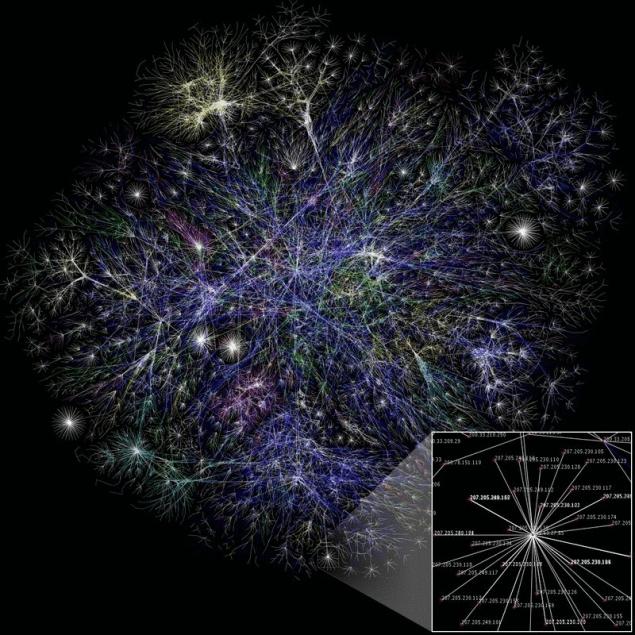
Visualization showing only a part of our communication network routes
"If we lose communication satellites, it will greatly reduce the bandwidth of communication channels," says Jonathan McDowell, an astrophysicist and a scientist of the Canadian Observatory, working with the Harvard-Smithsonian center for astrophysics.
According to McDowell, with the loss of communication satellites all telecommunications cables and networks, laid on the ground and under water, will be a useless pile of wires. Despite the fact that some types of communication capabilities will disappear in that case instantly, some will remain and will be able to function.
All international calls and data traffic will have to reroute through other channels, which will cause a huge increase of loads on terrestrial and undersea communication lines. The additional load will eventually reach its limits, and it will affect the many phone calls that just won't be able to walk to destinations. Useless would be cell phones. In remote areas people rely on satellite television, the Internet and radio, overnight will be in communication blockade.
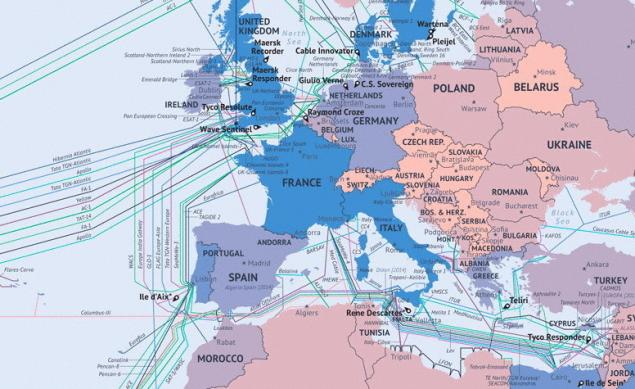
Map of underwater communication lines
"Yes, the TV actually disappear. Because a significant portion of this TV is provided by companies via satellite receivers," says McDowell.
It is important to note that in 1998, there was a precedent, which at large scale can lead to such tragic consequences for the inhabitants of the whole Earth. Then only one failed satellite was the cause of the disabled worldwide pagers.
Return to paper charts If the loss of satellites we lose and with access to the global positioning system. Over the years the GPS has become an essential service in our lives, which rely not only many people, but many computerized systems in various industries.
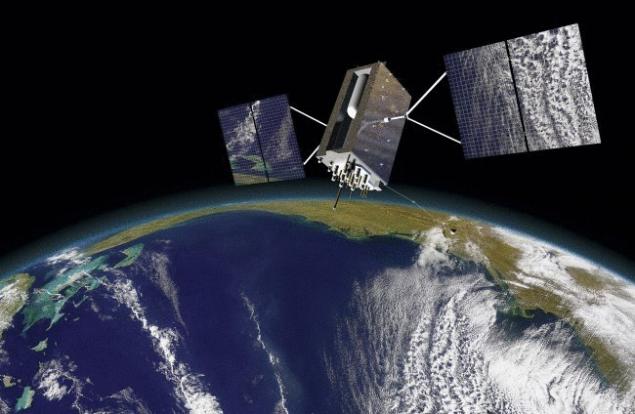
Satellite GPS III-AHI Lockheed Martin
"Not only that, many have just forgotten how to manage their cars without a GPS, and many aircraft rely on this system," explains McDowell.
Despite the fact that there are replacement methods and navigation system, airlines use GPS for laying the most economically advantageous (from the point of view of fuel consumption) routes. Without the GPS satellites and telecommunication satellites, controllers will be very difficult to communicate not only among themselves but also with the planes that are on their routes. The airlines will have to go back to older ways and systems of communication. And given the richness of today's air traffic, such a scenario will definitely increase the percentage of aircraft accidents. Suffer, of course, and other navigation systems used in cargo ships, as well as in the systems of supply and transportation. They all rely on GPS.
It should be noted that GPS is not just a means of providing information about the exact location. It is also a system that allows you to calculate the time frame. The same function can be, for example, ground-based atomic clocks, but GPS is used effectively to adjustments via satellite of a common time standard. In the absence of this feature, network that requires accurate time synchronization, you will experience "time-shift" that will lead to a serious loss of productivity and the failure of many services. All of this can lead to serious consequences. Will suffer everything from backbone networks of high voltage and ending with the financial sector.
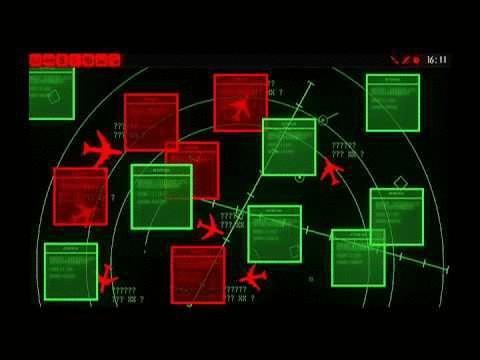
In his article "a Day without space: implications for the economy and national security," ed Morris, Executive Director, commercial use of space and the Department of Commerce writes:
"If you think that to cope with their work while the Internet will seem like a daunting task, imagine what would happen if you will lose the opportunity of communication by mobile phones, will lose access to television, radio, ATM machines, credit cards and possibly all the other electronic things that you use now. [...]"
"Wireless devices, especially those that work with CDMA will be useless. You will not be able to call from one cell to another. The computer network will experience latency, as data have to pass through the congested channels of communication with reduced bandwidth. The same applies to all the other major networks used for communication and entertainment, as they all use IP address and require maximum precision in the timings to make sure that the sent data has reached its destination."
Lack of proper synchronization in time will adversely affect the banking sector, because the timings of the transaction require recording. Credit cards and Bank accounts are likely to be completely frozen. Billions of dollars, euros and other currency will just disappear from the business. Probably shouldn't say that this will be followed by the greatest financial crisis?
Loss of military masinaigan loss of satellite capabilities will reduce the effectiveness of the armies.
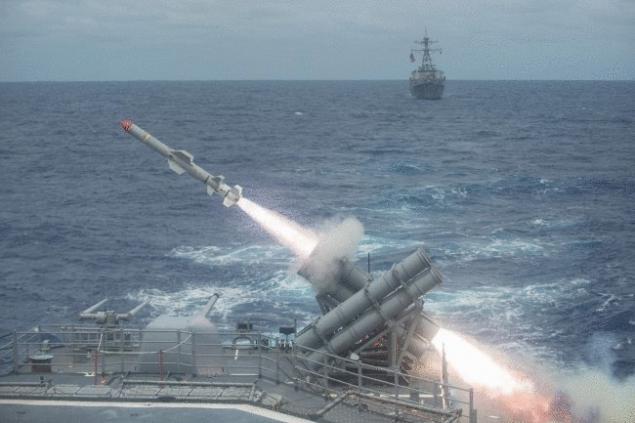
Missiles that rely on GPS data will be useless
Institute name of George Marshall explains the consequences that will affect US military power:
"Space is a critical link in the proper operation of all American military structures. The departments of logistics, navigation, communication, weather forecasting is the fact that military units will be useless".
McDowell calls the dependence on satellites is the Achilles ' heel of the US army.
Expert on fighting Peter W. singer of the New America Foundation says:
"Whoever controls the skies will control what happens in battles on the ground".
Summing up the consequences that will affect military capabilities, singer writes:
"Today employs about 1,100 active satellites. They are the nervous system of not only our economy but also our army. Literally everything from communications and ending with GPS and logistics, rely on these satellites. Potential opponents say that it is for this reason Russia and China have recently begun testing a new generation of ASAT weapons, which, in turn, led to additional inflows of $ 5 billion in US military budget for the development of various space weapons systems".
"What happens if we lose access to space? In this case, as one officer of the armed forces of the United States, "we have to fight with sticks and stones" because all our drones and our missiles, even ground equipment will be useless without GPS. This will force us to reconsider all our views about the readiness for combat of the 21st century. Maybe we have invisible warships of new generation, however, the loss of space will mean for us and the loss of the fleet. Everything will be like in the Battleship game, where two opposing sides, like blind kittens, will try to find each other in the theatre of hostilities".
In addition, McDowell notes that the loss of satellite capabilities will reduce the effectiveness of the management of the hostilities. Space systems can be used for observation. Without these capabilities, the army will be blind.
"Will lead all this to the fact that no one will know what is really going on," says McDowell.
"Satellites provide us with both global and local picture of what is happening. The loss of surveillance capabilities will reduce the adequacy and veracity of information received. And this is in turn can dramatically affect safety."
The national weather and climatology will go to procloeon of the most useful things which we have provided the satellites is the possibility of more accurate predictions of weather conditions in different regions of the world. The prediction of small cloud is all well and good, however, some countries, such as India, Pakistan and Bangladesh, depend on such systems of weather forecasting, because they can predict the possibility of catastrophic climate change. For example, the National oceanic and atmospheric administration estimated that during the annual hurricane seasons of weather satellites save up to $ 3 billion potential damage and human lives.
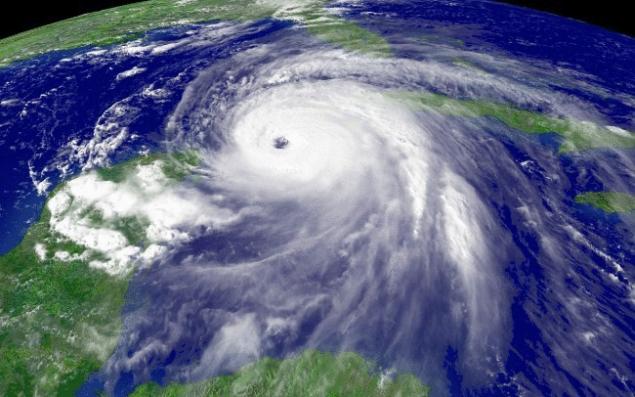
Hurricane Ivan
The loss of satellites will have an impact on science. Most of what we know about climate change, we know it thanks to satellites.
McDowell said that the major change will be seen in the first week alone. However, if you look at the issue in a 10-year term, the lack of access to satellites deprive us of the ability to understand and monitor such things as the ozone layer, the level of carbon dioxide in the atmosphere, and also the movement of ice in the oceans. Ground station and good old-fashioned weather balloons, of course, can help, but the accuracy of the data in this case will be much lower than it is now.
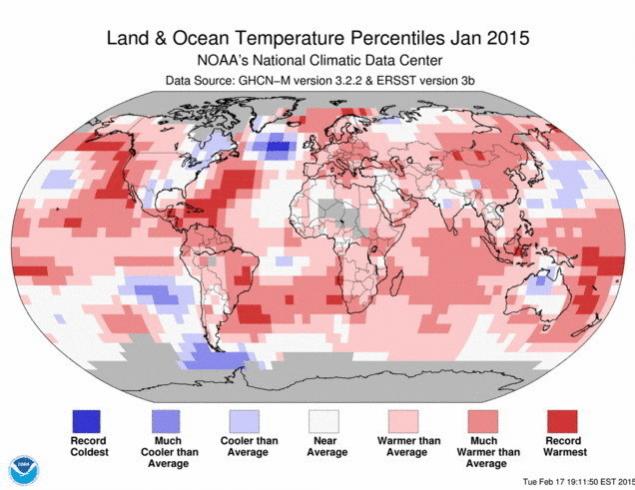
Without satellites, you can say goodbye to these cards
"We are too dependent on satellites, which are our eyes and tell us about what is happening on the planet. And tell us when it's really very, very necessary," continues McDowell.
Of course, we should not forget that without satellites we would not be able to monitor weather in space. For example, can not in time to know when needs to happen next solar storm.
Time for vosstanovlenie the loss of all satellites of the state's private companies will try to recover their space capabilities. Depending on the nature of the events, which will entail the destruction of all the satellites, you may need more than a dozen years in order to be able to return to normal standard technology. For example, occured an Outbreak of Carrington, and we have a very long time to restore the necessary infrastructure as invalid will not only satellites, but also all ground electronics.
The us army is already preparing for possible similar developments and is currently developing methods and tools that will very quickly establish a connection. These methods and means can be small satellites that can be launched into low earth orbit. Compact satellites they were launched in recent time are gaining popularity. They are easy to run, they are inexpensive and at the same time are an effective solution. However, short-term solution. The headquarters of the operational-space command of the United States is developing the concept of a method of disaster recovery ability for "rapid deployment that will meets military requirements within the entire spectrum of operations, ranging from action in time of peace, and ending military time".
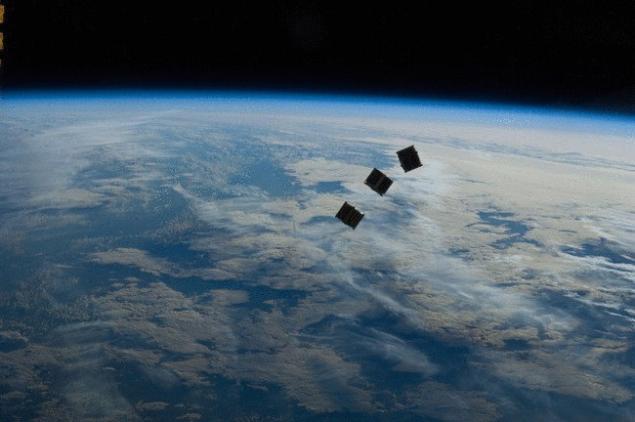
They were launched in orbit
The return of the same full-sized geostationary satellites into orbit will undoubtedly become more challenging. It would take years to just to build them. Not to mention the fact that you have to build a big expensive rocket that will these satellites bring to space.
In the event of a Kessler Effect, which will impress all of our satellites, the scheme of recovery and return to the technology will go in a completely different scenario. McDowell believes that the recovery in this case will take at least 11 years to clear low earth orbit of debris, otherwise all running objects at an altitude below 500 kilometers, just fall back to Earth.
Unfortunately, at a height of more than 600 kilometers above the Earth's surface, also known as geostationary Earth orbit, to get us to fail some time. Objects in geostationary orbit remain there for a very long time. It is possible that from the geostationary orbit in the end have to give. Or we can in this case manually try to clean, using currently known methods.
As you can see, the event Effect Kessler may be the most serious blow to our high-tech future, so we have to take into account the fact that this event do, sooner or later can happen and in that case the event will follow.published
Source: hi-news.ru

The assumption that the failure of all satellites or at least large numbers of, not as crazy as it may seem at first glance. There are at least three possible scenarios in which this can sooner or later occur.
For example, in a science fiction story "Ghost Fleet: A Novel of the Next World War" which will soon appear on store shelves, says that satellites can be shot down as a result of actions of the warring countries. In this book authored by P. W. singer and August stake a story like that in the near future go to war in which the Chinese government decides to use high-energy weapons mounted on satellites-interceptors to destroy the important strategic points in the United States. As a result, dozens of near-earth satellites are destroyed even before the moment starts fighting on the ground.

1986 DIA illustration of the work of the satellite interceptor, attacking your target
There is another scenario, in which all satellites can be destroyed. Jeff Cater, associate Professor Institute named the George C. Marshall research center in Virginia, engaged in scientific and socio-political issues — says that the combatants can destroy satellites from the ground stations using special jammers, missiles, lasers, and nuclear weapons.
In addition, all of our satellites can be destroyed by very strong solar storm. The so-called Carrington Flare, a solar hurricane, one of which happened, for example, in 1859. Occured he now — and all of our high-tech civilization back in development back several generations. How the portal Universe Today, such a heavy duty geomagnetic storm will simply cause an overload in power transmission systems on Earth and fry all our electronic devices, including those that are in orbit of the planet.
"In this case, particles pass through the Earth and carry the incredibly powerful electrical discharge," writes Universe Today.- "If close to Earth are satellites, they in most cases are under the protection of the geomagnetic field of the planet, but the satellites in higher orbits, especially those that are in geosynchronous orbits, completely defenseless against such phenomena. In the storm inside the satellite will accumulate charged particles, which in the end will release a powerful electrical discharge that will lead to a complete damage of the components of the satellite. They'll just burn out."
Universe Today indicates that now, several hundred satellites in geosynchronous orbit around the planet, remain very vulnerable. The risk factor also includes the satellites at an altitude of 20,000 kilometers and are responsible for the GPS network.

Gravity
In the end, one should not exclude the Syndrome (the Effect) Kessler. This scenario was described in the film "gravity" 2013. Downed Russian spy satellite and scattered after the debris has caused a chain reaction, which resulted in the near-earth space turned into a real dump of broken satellites and even space stations, which, of course, have endangered the lives of all in the space of the astronauts. Scary to admit, but Syndrome (the Effect) Kessler is really very probable, and this probability only increases with the accumulated in orbit after space launch debris.
Realizing the development opportunity described above events, it would be logical to ask the question: what will happen if one of these events happens what is called here and now. In General, the total loss of satellites will lead to a serious failure in our current high-tech life. The consequences will be both short and long-term while covering many of the areas.
The loss of connection Almost immediately we will witness a sharp decline in our ability to communicate, transfer information and conduct various digital transactions.

Visualization showing only a part of our communication network routes
"If we lose communication satellites, it will greatly reduce the bandwidth of communication channels," says Jonathan McDowell, an astrophysicist and a scientist of the Canadian Observatory, working with the Harvard-Smithsonian center for astrophysics.
According to McDowell, with the loss of communication satellites all telecommunications cables and networks, laid on the ground and under water, will be a useless pile of wires. Despite the fact that some types of communication capabilities will disappear in that case instantly, some will remain and will be able to function.
All international calls and data traffic will have to reroute through other channels, which will cause a huge increase of loads on terrestrial and undersea communication lines. The additional load will eventually reach its limits, and it will affect the many phone calls that just won't be able to walk to destinations. Useless would be cell phones. In remote areas people rely on satellite television, the Internet and radio, overnight will be in communication blockade.

Map of underwater communication lines
"Yes, the TV actually disappear. Because a significant portion of this TV is provided by companies via satellite receivers," says McDowell.
It is important to note that in 1998, there was a precedent, which at large scale can lead to such tragic consequences for the inhabitants of the whole Earth. Then only one failed satellite was the cause of the disabled worldwide pagers.
Return to paper charts If the loss of satellites we lose and with access to the global positioning system. Over the years the GPS has become an essential service in our lives, which rely not only many people, but many computerized systems in various industries.

Satellite GPS III-AHI Lockheed Martin
"Not only that, many have just forgotten how to manage their cars without a GPS, and many aircraft rely on this system," explains McDowell.
Despite the fact that there are replacement methods and navigation system, airlines use GPS for laying the most economically advantageous (from the point of view of fuel consumption) routes. Without the GPS satellites and telecommunication satellites, controllers will be very difficult to communicate not only among themselves but also with the planes that are on their routes. The airlines will have to go back to older ways and systems of communication. And given the richness of today's air traffic, such a scenario will definitely increase the percentage of aircraft accidents. Suffer, of course, and other navigation systems used in cargo ships, as well as in the systems of supply and transportation. They all rely on GPS.
It should be noted that GPS is not just a means of providing information about the exact location. It is also a system that allows you to calculate the time frame. The same function can be, for example, ground-based atomic clocks, but GPS is used effectively to adjustments via satellite of a common time standard. In the absence of this feature, network that requires accurate time synchronization, you will experience "time-shift" that will lead to a serious loss of productivity and the failure of many services. All of this can lead to serious consequences. Will suffer everything from backbone networks of high voltage and ending with the financial sector.

In his article "a Day without space: implications for the economy and national security," ed Morris, Executive Director, commercial use of space and the Department of Commerce writes:
"If you think that to cope with their work while the Internet will seem like a daunting task, imagine what would happen if you will lose the opportunity of communication by mobile phones, will lose access to television, radio, ATM machines, credit cards and possibly all the other electronic things that you use now. [...]"
"Wireless devices, especially those that work with CDMA will be useless. You will not be able to call from one cell to another. The computer network will experience latency, as data have to pass through the congested channels of communication with reduced bandwidth. The same applies to all the other major networks used for communication and entertainment, as they all use IP address and require maximum precision in the timings to make sure that the sent data has reached its destination."
Lack of proper synchronization in time will adversely affect the banking sector, because the timings of the transaction require recording. Credit cards and Bank accounts are likely to be completely frozen. Billions of dollars, euros and other currency will just disappear from the business. Probably shouldn't say that this will be followed by the greatest financial crisis?
Loss of military masinaigan loss of satellite capabilities will reduce the effectiveness of the armies.

Missiles that rely on GPS data will be useless
Institute name of George Marshall explains the consequences that will affect US military power:
"Space is a critical link in the proper operation of all American military structures. The departments of logistics, navigation, communication, weather forecasting is the fact that military units will be useless".
McDowell calls the dependence on satellites is the Achilles ' heel of the US army.
Expert on fighting Peter W. singer of the New America Foundation says:
"Whoever controls the skies will control what happens in battles on the ground".
Summing up the consequences that will affect military capabilities, singer writes:
"Today employs about 1,100 active satellites. They are the nervous system of not only our economy but also our army. Literally everything from communications and ending with GPS and logistics, rely on these satellites. Potential opponents say that it is for this reason Russia and China have recently begun testing a new generation of ASAT weapons, which, in turn, led to additional inflows of $ 5 billion in US military budget for the development of various space weapons systems".
"What happens if we lose access to space? In this case, as one officer of the armed forces of the United States, "we have to fight with sticks and stones" because all our drones and our missiles, even ground equipment will be useless without GPS. This will force us to reconsider all our views about the readiness for combat of the 21st century. Maybe we have invisible warships of new generation, however, the loss of space will mean for us and the loss of the fleet. Everything will be like in the Battleship game, where two opposing sides, like blind kittens, will try to find each other in the theatre of hostilities".
In addition, McDowell notes that the loss of satellite capabilities will reduce the effectiveness of the management of the hostilities. Space systems can be used for observation. Without these capabilities, the army will be blind.
"Will lead all this to the fact that no one will know what is really going on," says McDowell.
"Satellites provide us with both global and local picture of what is happening. The loss of surveillance capabilities will reduce the adequacy and veracity of information received. And this is in turn can dramatically affect safety."
The national weather and climatology will go to procloeon of the most useful things which we have provided the satellites is the possibility of more accurate predictions of weather conditions in different regions of the world. The prediction of small cloud is all well and good, however, some countries, such as India, Pakistan and Bangladesh, depend on such systems of weather forecasting, because they can predict the possibility of catastrophic climate change. For example, the National oceanic and atmospheric administration estimated that during the annual hurricane seasons of weather satellites save up to $ 3 billion potential damage and human lives.

Hurricane Ivan
The loss of satellites will have an impact on science. Most of what we know about climate change, we know it thanks to satellites.
McDowell said that the major change will be seen in the first week alone. However, if you look at the issue in a 10-year term, the lack of access to satellites deprive us of the ability to understand and monitor such things as the ozone layer, the level of carbon dioxide in the atmosphere, and also the movement of ice in the oceans. Ground station and good old-fashioned weather balloons, of course, can help, but the accuracy of the data in this case will be much lower than it is now.

Without satellites, you can say goodbye to these cards
"We are too dependent on satellites, which are our eyes and tell us about what is happening on the planet. And tell us when it's really very, very necessary," continues McDowell.
Of course, we should not forget that without satellites we would not be able to monitor weather in space. For example, can not in time to know when needs to happen next solar storm.
Time for vosstanovlenie the loss of all satellites of the state's private companies will try to recover their space capabilities. Depending on the nature of the events, which will entail the destruction of all the satellites, you may need more than a dozen years in order to be able to return to normal standard technology. For example, occured an Outbreak of Carrington, and we have a very long time to restore the necessary infrastructure as invalid will not only satellites, but also all ground electronics.
The us army is already preparing for possible similar developments and is currently developing methods and tools that will very quickly establish a connection. These methods and means can be small satellites that can be launched into low earth orbit. Compact satellites they were launched in recent time are gaining popularity. They are easy to run, they are inexpensive and at the same time are an effective solution. However, short-term solution. The headquarters of the operational-space command of the United States is developing the concept of a method of disaster recovery ability for "rapid deployment that will meets military requirements within the entire spectrum of operations, ranging from action in time of peace, and ending military time".

They were launched in orbit
The return of the same full-sized geostationary satellites into orbit will undoubtedly become more challenging. It would take years to just to build them. Not to mention the fact that you have to build a big expensive rocket that will these satellites bring to space.
In the event of a Kessler Effect, which will impress all of our satellites, the scheme of recovery and return to the technology will go in a completely different scenario. McDowell believes that the recovery in this case will take at least 11 years to clear low earth orbit of debris, otherwise all running objects at an altitude below 500 kilometers, just fall back to Earth.
Unfortunately, at a height of more than 600 kilometers above the Earth's surface, also known as geostationary Earth orbit, to get us to fail some time. Objects in geostationary orbit remain there for a very long time. It is possible that from the geostationary orbit in the end have to give. Or we can in this case manually try to clean, using currently known methods.
As you can see, the event Effect Kessler may be the most serious blow to our high-tech future, so we have to take into account the fact that this event do, sooner or later can happen and in that case the event will follow.published
Source: hi-news.ru
Tags
See also
We checked what happens if you drink beer
57 years ago launched the world's first artificial satellite of the Earth
What would happen if the Solar system will be a black hole?
50 years of the launch of Sputnik
Man in Space!
What if you discovered a lump in her breast?
Oil Rossiya.Chto expect in the near future
If you just assume
As I trained at a startup in San Francisco and went home
















